Our History
The Muslim Hands story
Beginnings
Muslim Hands South Africa has been working with some of the most deprived communities in the world. We have responded to numerous emergencies as well as establishing long-term projects in over 30 countries since 1996.
We run orphan sponsorship schemes in Asia, Africa, Europe and the Middle East and while also supporting livelihoods, education, water and health projects worldwide.
We have built up a network of international offices and local experts over the years and have accumulated a wealth of skills and experience in supporting those most in need.
As we move forward, Muslim Hands remains committed to helping those in crisis as well as supporting and empowering global communities over the long-term.

Muslim Hands Timeline
20 years of Helping Those in Need
Discover the history of Muslim Hands
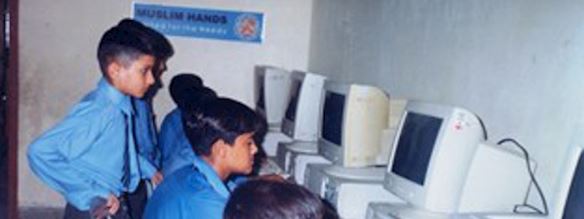
Expansion
MH responded immediately to the Mozambique floods, sending two four-wheel drive ambulances from the UK. In addition, a medical team, mobile medical units and food parcels travelled to remote communities. With infant malnutrition at epidemic proportions, nutritionists were employed at centres to administer high energy feeding and nurse young children back to health. A Low Cost Housing programme helped build new homes from local materials, giving families shelter lasting up to 30 years.
Elsewhere
- Africa, Asia & the Balkans: Muslim Hands Orphan Sponsorship Scheme starts.
- Kashmir: 4 vocational training centres for women set up helping widows and other needy women.
- First computer literacy centre opened in Wazirabad, Pakistan, catering for students of various ages, and trains local teachers.
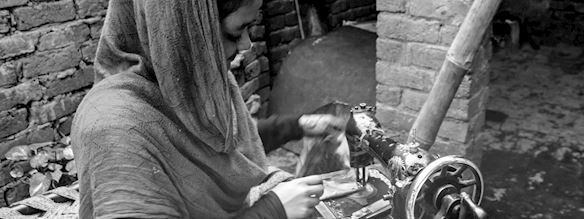
Afghanistan
Amongst the many diverse projects Muslim Hands initiated in 1997 were those to improve the quality of life for Afghans traumatised by the seemingly endless violence in their country.
The Women’s Sewing Centre trained women in design, sewing and embroidery. Each woman was equipped with a free sewing machine so she could earn a regular income.
A Women’s Hifdh Centre gave a unique opportunity for learning curricular subjects as well as Hifdh-ul-Quran.
The Hardship and Legal Aid committee also provided financial and legal assistance to those who could not afford advocate fees or legal expenses.
Elsewhere
- Iran-Afghanistan border struck by killer earthquake. MH teams with Iran Red Crescent fly in urgent aid. 100 new beds and medical equipment given to local hospital.
- Somalia: 10 feeding centres run for victims of drought.
- Muslim Hands Orphan Sponsorship Scheme is great success, reaching 1200 families in two years.
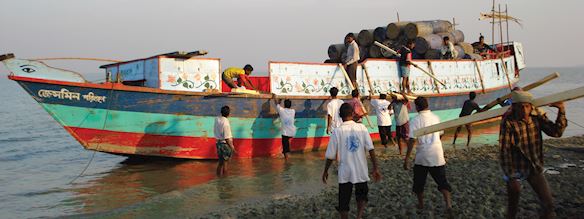
Bangladesh floods
This year saw one-third of Bangladesh submerged with the most devastating floods of the decade. Muslim Hands distributed food, medicine and clothes and medical camps were established in-and-around Dhaka. MH workers reached otherwise inaccessible villages by boat.
A comprehensive programme for rebuilding homes, repairing infrastructure and installing hand-pumps was initiated. The Housing Project reached out to the neediest segments of society with low-cost homes built of bamboo, clay and corrugated metal sheets.
Elsewhere
- In Kashmir trainees at vocational centres form a cooperative.
- A small business generation scheme provides rickshaws.
- Tanzania: The construction of a madrassa in Karates well over 100 changa accomodildren.
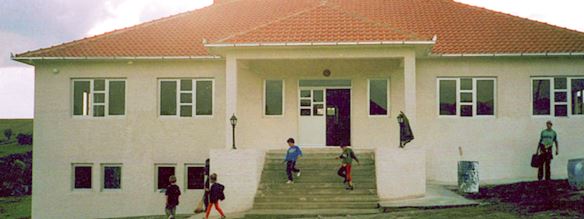
Europe and the Balkans
With the bombing of Kosova in March, refugees began to flood over the border to Albania. Local MH teams assisted the new arrivals by distributing food parcels, blankets and mattresses. MH also employed 45 sanitation workers to run a 24-hour clean-up operation in Tirana camps. An Educational Play Therapy programme helped more than 1,000 children in Tirana suffering from trauma. 12 ambulance units were deployed, providing a 24-hour medical service. When refugees returned to Kosova, MH accompanied them with a convoy consisting of 42 trucks,full of essential food and medical supplies.
In August, Turkish families were forced to take shelter inside vehicles or make-shift tents with no food or sanitation after a devastating earthquake, which eventually killed more than 17,000 people. MH began distributing food and clean water immediately. 12,000 meals were served daily to the displaced.
August saw Chechnya plunged into war against Russia. In response, MH established a full time office in Georgia helping refugees. MH also worked within Chechnya. Four schools for refugee children were established, regular food, clothing and fuel distribution was carried out and financial support provided to the severely sick and injured.
Elsewhere
- Eye-care: Eye-camps examine and treat more than 750 catract sufferers.
- Bangladesh: 470 new homes built for homeless families.
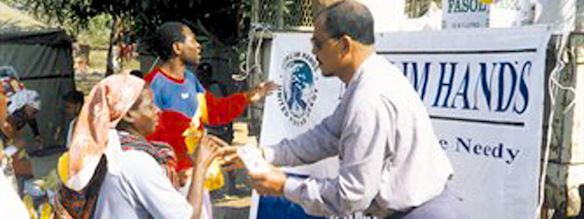
Mozambique flood
MH responded immediately to the Mozambique floods, sending two four-wheel drive ambulances from the UK. In addition, a medical team, mobile medical units and food parcels travelled to remote communities. With infant malnutrition at epidemic proportions, nutritionists were employed at centres to administer high energy feeding and nurse young children back to health. A Low Cost Housing programme helped build new homes from local materials, giving families shelter lasting up to 30 years.
Elsewhere
- Four schools are established for Chechen refugee children.
- The sacking of Grozny: Muslim Hands provides regular food, clothing and shelter to 7000 refugees in Georgia.
- Drought in Balochistan, Pakistan: Four temporary feeding centers fed 30'000 people.
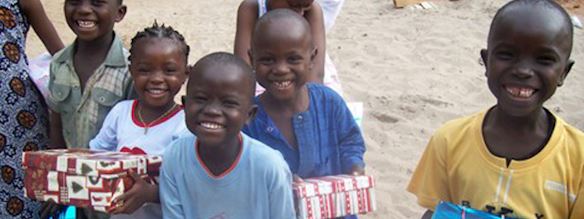
Eid Gifts Programme
MH began the initiative of the Eid Gifts Programme, where donors are able to send a gift to a disadvantaged Muslim child for only £10. A total of 4,400 Eid gifts were distributed to children across a wide variety of countries including Palestine, Afghanistan, India, Bangladesh, Gambia, Sudan, Senegal, Mexico, Albania, Kosova and Chechnya. Each of the gift boxes contained items such as new shoes, clothes and a school bag.
Elsewhere
- Palestine: Al-Aqsa intifida plunged Palestinians into deeper poverty. Alongside food parcels medical clinics were set up in Al-Khalil, a school bus service was provided for orphans and 100 university students were sponsored.
- India Earthquake: 60,000 people recieved vital food supplies and 1,000 families recieved tents. 42 new homes also built.
- Over 850 tubewells installed in Pakistan, India, Bangladesh, Gambia and Senegal.
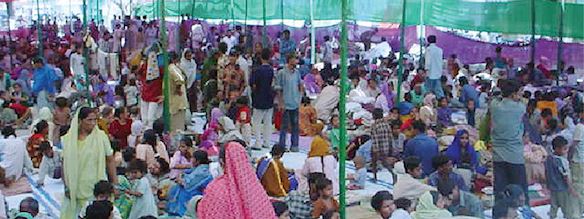
Gujarat violence
Donations received in response to the violence and riots in Gujarat were used for a multi-pronged approach to rebuild and heal the communities affected. Food parcels, clothing, bedding and household kits were distributed. At a community level, emergency medical care and mobile medical units were dispatched. Some 300 mosques were renovated and new homes were built. The Small Loans Scheme helped people regain self-sufficiency.
Elsewhere
- US led war on Afghanistan bought further suffering to impoverished Afghans. 400 tonne food convoys immediately sent in via Pakistan.
- Azerbaijan and Lebanon: bringing the total number of families supported to 1,800 in 17 countries worldwide.
- Emergency medical clinics, mobile medical units and ambulance service set up to serve Kabul, Kandhar, Jalalbad, Chaman and Peshwar. 100 school kits and 300 wheelchairs distributed.
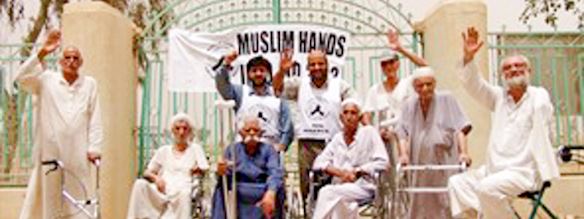
Iraq
Alhamdulillah, MH was and remains one of the few charities able to operate in devastated Iraq. A large number of projects were completed including the reconstruction of four schools in Fallujah and orphanages in Baghdad and Mosul. Vital equipment for a gynaecology department, blood banks, clinical laboratories and four operating theatres were also supplied. A unique homeless centre for teenage girls provides protection from the dangers of the Baghdad streets.
Elsewhere
- Kashmir and Pakistan: Helping the disabled in the developing world was a focal commitment of MH in 2003. MH set up rehabilitation and vocational training centres and provided financial grants in order to turn disabled people's skills into businesses.
- Gambia: MH launched a scheme to assist Gambian Fisherwomen in becoming self sufficient and self employed workers.
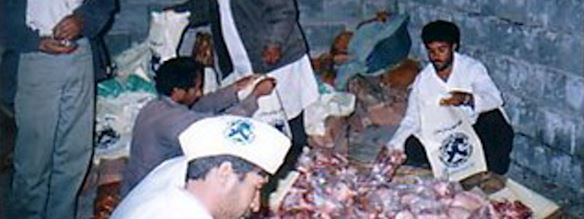
Iraq and Qurbani
Muslim Hands was able to continue to deliver aid across Iraq, even in Fallujah, Najaf and Karbala. MH provided the Fallujah City Water Treatment Plant with a large water pump. Regular food distribution was also carried out to Al-Rashad Elderly Home, Elweeyah Orphanage, Wazeeryah Orphanage and Al-Tufulah Orphanage. Other projects undertaken include a training programme for Iraqi NGOs and financial support for Hajj pilgrims.
The Bam earthquake in 2003 killed more than 45,000 and left 100,000 homeless. Qurbani meat was distributed to 32,000 people on behalf of donors and other charities. For sanitation, 30 latrines and 20 field showers were installed. A Muslim Hands office was opened in Jiroft to supervise disease prevention and rebuilding programmes. The Mayor of Bam gave Muslim Hands four acres of land to construct an orphanage and school for 100 children.
Elsewhere
- Darfur, Sudan: Muslim Hands sets up camps for 100,000 refugees in Kalima and Mosai. As well as distributing water, food and shelter, lanterns are distributed, medical centres set-up and temporary schools founded.
- Bangladesh: Muslim Hands provides aid and new housing to some of the 2 million made homeless by the worst floods seen in 20 years.
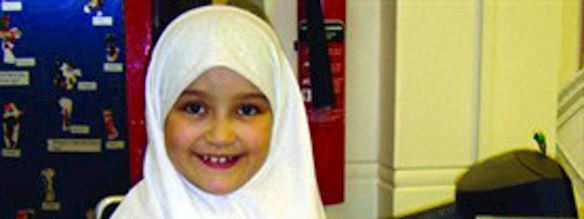
Green Ribbon Week
Green Ribbon Week was launched in order to raise awareness of the plight of the suffering of countless children of war in some of the most devastated countries in the world. Through the funds raised; 75 children in Afghanistan were fitted with prosthetic limbs at an MH Orthopaedic and Prosthetic Clinic in Kabul, schools in Iraq were provided with sports equipment to help children feel a sense of normalcy in their difficult living conditions and Sudanese children in Darfur were granted vaccinations and healthcare.
The strongest earthquake for 100 years hit Kashmir and Pakistan killing almost 80,000 people and leaving million homeless. MH teams operated camps helpings tens of thousands of survivors and began construction of shelters.
Elsewhere
- Safe water, an electricity generator and water treatment plant in Baghdad were also set up as well as care homes supporting the elderly and disabled.
- Earthquake in Indonesia: Less than 6 months after the Tsunami of 2004, an earthquake hit Indonesia, killing 5,500. By virtue of the continued relief effort after the Tsunami, MH was able to despatch Emergency Response Teams from Jakarta, Aceh and Medan.
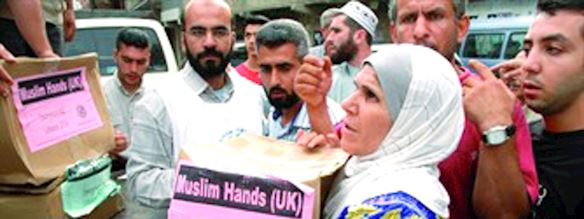
Gaza
An economy in ruins, endemic poverty and Israeli bombing rendered the humanitarian situation in Gaza, desperate. MH handed out vital food supplies, tents and water storage tanks. Medical equipment was provided to Al-Wafa Hospital to cope with the growing burden under siege.
In Lebanon, mobile medical units were purchased and deployed in Saida and surrounding areas. Over 6,000 food parcels, hot food and medical care were provided to the thousands displaced by the bombing in Saida, Tyre and Beirut. MH provided safe water tankers & mobile power generators for southern villages after existing electric water pumps were disabled.
Muslim Hands established seven large refugee camps to cater for over 60,000 homeless people during the Pakistan Earthquake.
Elsewhere
- Pakistan: Muslim Hands established seven large refugee camps to cater for over 60,000 homeless people during the Pakistan Earthquake, providing emergency medical assistance and sending over 250 workers and volunteers to the Muzaffarabad area. Muslim Hands set up temporary medical clinics and three new schools in aid camps.
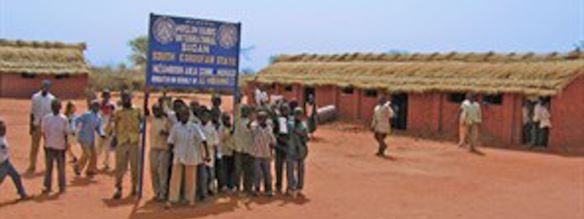
Cyclone Sidr
Cyclone Sidr brought destruction to already poor and needy communities living along the coastal areas of Bangladesh. MH Bangladesh response teams in Barguna, Pirojpur, and Patuakhali were immediately despatched to relieve victims with food, shelter, clean water, medicine and transportation
Muslim Hands rebuilt schools across Maysaloon, Ishtar and Al Kindy in Iraq to serve over 1,150 students.
Elsewhere
- MH Afghanistan renovates the obstetrics and gynaecology wards at the University Teaching Hospital in Jalalabad where 1,500 patients are treated each month.
- MH Palestine opens a new office in Gaza.
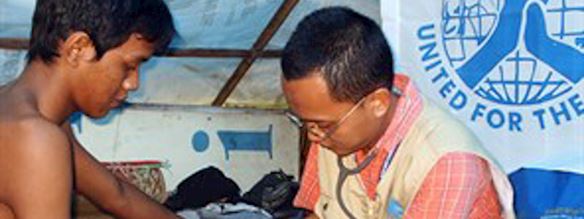
Bangladesh and China
MH responded immediately to natural disasters including the Sichuan earthquake in China, Cyclone Sidr in Bangladesh and Cyclone Nargis in Burma; with the provision of food, clean water, medical aid, sanitation equipment and utensils.
MH organised a sponsored walk along the Great Wall of China as part of Green Ribbon Week 2008. Fundraising took place up and down the country, raising money for 'Innocent Children of War'.
Elsewhere
- MH opened a School of Excellence in Mali, as well as Vocational Training Centres in Afghanistan and Indonesia. MH provided boarding facilities to schools in Nepal and China. MH also supplied school equipment and stationary to 2,000 students in 20 of the poorest schools in Gaza, Palestine.
- MH has over 1,000 orphans sponsored through our orphan sponsorship campaign during Ramadan.
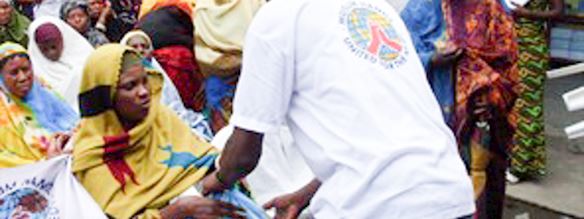
Conflict in the Congo
Conflict in the North Kivu province of the Democratic Republic of Congo caused a humanitarian catastrophe as tens of thousands of civilians were driven from their homes to the countryside, leaving them vulnerable and in danger.MH UK and South Africa immediately provided refugee camps with urgently needed shelter, food and medical supplies, helping families in and around Goma, the provincial capital bordering Rwanda.
Elsewhere
- Gaza war: MH office in Gaza assisted in the worst hit area of Jabaliyya by distributing food and medicine. Al-Shifa hospital and five other hospitals were supplied with medical equipment and medicines.
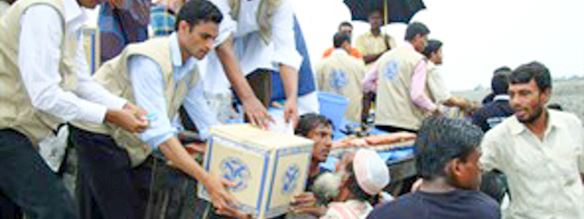
Cyclone Aila in Bangladesh
The devastating Cyclone Aila in Bangladesh left at least 179 dead and over 400,000 people homeless. Experienced in emergency relief, MH Bangladesh urgently dispatched aid teams to villages, travelling by boat through treacherous conditions. Teams distributed vitally needed supplies, such as food and clothes and began rebuilding homes in District Satkhira, and Shyamnagar Upazila.
Muslim Hands Pakistan provided over 361,000 flood victims with cooked food and distributed 33,400 family food parcels. MH field clinics treated over 114,000 patients. Immediately after the emergency phase, MH constructed 600 homes.
After an earthquake devastated Haiti, MH was present on the ground in Port au Prince within a matter of days distributing food and water to 20,000 people. With local volunteers, MH began rescue operations and cleared bodies from the rubble. Three schools were also established in the area.
Elsewhere
- Muslim Hands Pakistan provided over 361,500 people with cooked food and distributed 33,400 family food parcels. MH field clinics treated over 114,500 patients. Immediately after the emergency phase MH constructed 600 homes.
- Haiti earthquake: MH was present on the ground in Port au Prince within a matter of days distributing food and water to 20,000 people. With local volunteers, MH began rescue operations and cleared bodies from the rubble. Three schools were also established in the area.
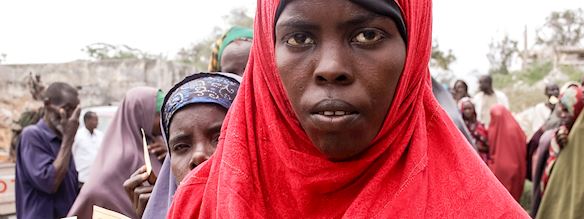
Ivory Coast
As the military took control of the country in 2011, further civil unrest within the Ivory Coast forced over a million people from their homes. Over 150,000 refugees fled to Liberia where they sought security and protection from escalating violence. Working in the Nimba region, MH Liberia supported displaced families across Saclepea, Boutuo and Karnplay Camps with monthly food packages and safe water.
During the Libyan crisis MH teams worked with the UNCHR at Shousa refugee camp near Ras Ajdir. At the Djerba airport Muslim Hands provided 5,000 people a day with food.
When a famine struck East Africa MH distributed food, water, medicine and tents to over 50,000 refugees and IDP's in Kenya, Ethiopia and Somalia. Water tankers were used to supply camps in Ethiopia and Somalia.
Elsewhere
- Japan tsunami: MH volunteers based in Nagata (near Tokyo), filled a bus with food and other essential items and distributed them to stranded families in the Fukushima Prefecture.
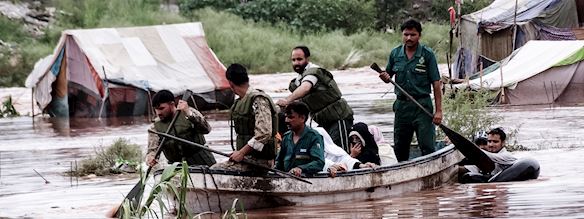
Pakistan floods
This year another flood hit Pakistan.Targeting the worst affected areas of DG Khan and Rajanpur, MH Pakistan distributed food and essentials to over 800,000 people and over 1,000 homes were reconstructed.
As the Syria crisis worsened, MH distributed food and hygiene kits to over 20,000 refugees on the Turkish and Lebanese borders. More than 1,000 Syrian refugees received treatment, medication and healthcare advice from the MH medical clinic set up in Bekaa Valley, Lebanon.
Muslim Hands established the Department for Community Development in order to address the issues facing UK communities.
Elsewhere
- During the continuing Gaza conflict MH distributed food and medicine in the worst hit areas. Six hospitals were also equipped with medical supplies to treat the injured.
- After conflict broke out in Myanmar, MH was one of the few charities to be granted access to the affected Rohingya Muslims in the Rakhine State. More than 2,000 displaced families received emergency relief packs and 400 families were rehoused.
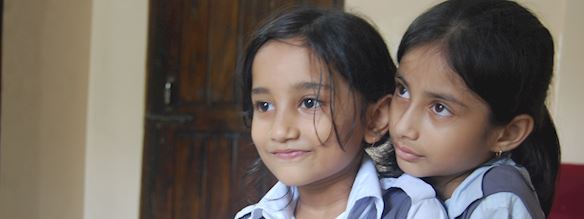
Sylhet School of Excellence
Muslim Hands distributed school kits, including uniforms and school bags in the Sylhet School of Excellence.
After a fire ravaged Birta Village in Nepal’s Rautahat district in April, the Muslim Hands emergency response team oversaw the repair of 27 tube-wells, ensuring villagers had access to clean water, and provided temporary shelter for those whose homes had been destroyed.
Our UK Development team provided support for victims of the UK floods, rolled out programmes helping drug abusers in Leicester and Nottingham and assisted food banks across the country.
Elsewhere
- MH is helping to educate over 40,000 needy students in 300 schools around the world.
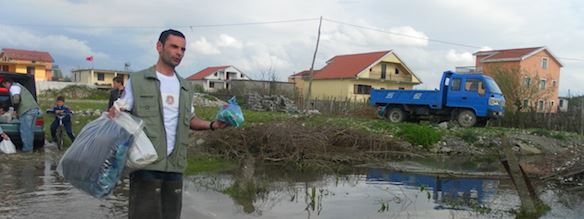
Albanian floods
MH distributed emergency aid, including food and blankets to flood victims in Shkoder, north-western Albania.
A large, multifaceted livelihoods project was undertaken by MH. This saw the distribution of livestock, seeds and farming tools and the planting of fruit trees to support rural communities in northern Sri-Lanka.
Muslim Hands provided support for grassroots organisations working with street children in Pakistan and Kenya. MH also sponsored children living on the streets of Pakistan and The Philippines to form youth football teams to take part in Street Child World Cup 2014. The success of the Pakistan team, who came third in the tournament, prompted a nationwide campaign advocating for the rights of street children all over the country.
Elsewhere
- The Uk Community Development Department expanded their work in youth engagement through sports and skills building activities and partnered with Muslim Youth Helpline to address the concerns of Muslim prisoners.
- Muslim Hands opened a second school in Idlib province, Syria, where 1 in 5 schools is no longer functioning. Haas and Al-Fatera schools are collectively educating almost 1,000 children.
- Muslim Hands distributed emergency food and hygiene packs to almost 2,000 flood victims in Wazirabad, Pakistan.
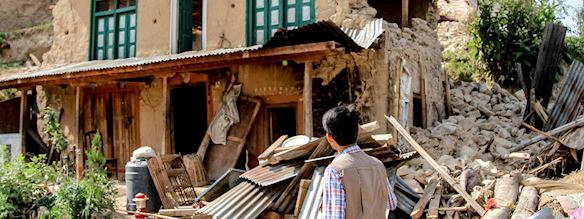
Nepal and Yemen
Muslim Hands responded to the earthquakes in Nepal immediately, distributing essential food items and hygiene kits to the most remote areas and carrying out construction of low-cost housing to provide long-term shelter to the homeless.
Following the outbreak of conflict in Yemen, Muslim Hands carried out food distribution in Sana'a, Aden and Hadhramout.
In May thousands of migrants, the majority of them Rohingya Muslims fleeing persecution in Myanmar were stranded at sea. As rescue operations began, MH Indonesia distributed vital relief, including food, medicine and hygiene items to hundreds of migrants in camps in Aceh Province.
Elsewhere
- The construction of low-cost housing for the victims of conflict in Myanmar continues.
- Muslim Hands continues to support street children in Kenya and Pakistan through the provision of shelters, vocational and educational training programmes and engagement through sport.
- The Muslim Women in Prison Report was launched, following a one year pilot project in HMP Ashkam Grange and New Hall and MH is supporting a programme tackling domestic violence in Birmingham

Established in 1996, Muslim Hands SA NPC is an aid agency and NGO aiming to help those affected by natural disasters, conflict and poverty. It is a branch of Muslim Hands UK established in 1993 in Nottingham.



